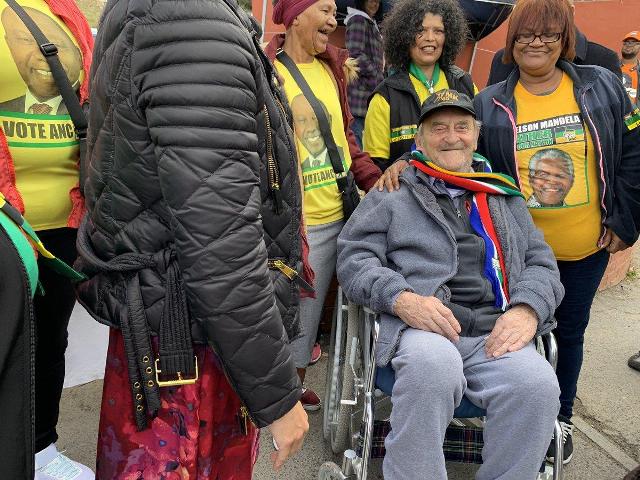Anti-apartheid campaigner Denis Goldberg casts vote in Hout Bay, Cape Town
Goldberg said he chose to come out to vote and not apply for a special vote because he wanted to be out and not isolated from other voters.

- Country:
- South Africa
Anti-apartheid campaigner Denis Goldberg, who is one of the two Rivonia Trialists still alive, said voting and determining South Africa’s democracy is what his generation always wanted.
Goldberg said this shortly after casting his vote at the Sentinel Primary School in Hout Bay, Cape Town, on Wednesday.
“I want to tell you I feel gratified with that generation of Mandela, Sisulu, Mbeki, me and lots of others. This is what we wanted that we could build our democracy and see how far we have come; how far we have got to go and you know … all the things, we have done well.
“But we are not writing about all the things we have done well. We have a democracy, we are voting again, we are voting peacefully. I see children of Hout Bay going to school. I see kids in motor scooters, some in cars and I see all sorts of nice things happening. There are football and projects among the youth,” he said.
Goldberg said he chose to come out to vote and not apply for a special vote because he wanted to be out and not isolated from other voters.
Goldberg has traceable struggle credentials having joined the SA Communist Party in the 1950s. He was later recruited to join Umkhonto we Sizwe, the ANC’s secret armed wing in 1961 and helped the anti-apartheid movement with his engineering skills.
His skills came in handy in that he helped to devise weapons and explosive material in that era.
He was arrested two years later – in 1963 – and appeared before the Pretoria Supreme Court and along with former President Nelson Mandela, Govan Mbeki, Walter Sisulu, and others, was charged under the Sabotage and the Suppression of Communism Acts for campaigning to overthrow the Government by violent revolution and for assisting an armed invasion of the country by foreign troops.
The trial later became known as the Rivonia trial and after a guilty conviction, Goldberg was sentenced to life imprisonment at the Pretoria Local Prison.
Speaking outside the voting station on Wednesday, Goldberg said a lot has been done since 1994 and that there is a lot to be happy about while acknowledging that mistakes were made along the way.
“I think we have come a very, very long way since 1994 but we have also made mistakes. Those who were privileged don’t willingly give it up. Those who were not privileged and are edged onto the fringes of being privileged to have become very greedy. What we fought for was equality, not to make a new elite, to make a general social democracy. Now we have a new leadership of the ANC and given sufficient majority, [President Cyril] Ramaphosa will be in a position to deal with the corrupt elements,” he said.
Lawson Naidoo, an executive secretary for the Council for the Advancement of the South African Constitution (CASAC) – one of several organisations accredited to observe the elections – said by mid-morning, voting had proceeded smoothly without hiccups at voting stations him and his team had visited.
“This is meant to be a mobile observer unit moving around Cape Town to [observe], potentially, where there might be problems. But so far we have not come across any problems except for minor technical issues with the zip zap [automatic scanners] machines at voting stations. But except for that, everything seems to be running smoothly,” he said.
(With Inputs from South African Government Press Release)
ALSO READ
South Korea's Yoon joins early voting ahead of parliamentary elections
South Korea's Yoon joins early voting ahead of parliamentary elections
Election is between those trying to destroy Constitution and democracy and those trying to protect them: Rahul Gandhi.
Election is between those who are trying to destroy Constitution and democracy and those trying to protect them: Rahul Gandhi.
"Communists destroyed democracy in Tripura..." : CM Manik Saha










